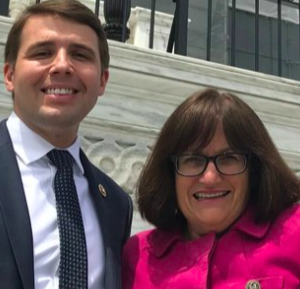When it comes to the green energy mandates supported by U.S. Reps. Annie Kuster and Chris Pappas, it’s a case of “if you like your car, you can keep your car.”
Unless it runs on gasoline.
Both of New Hampshire’s U.S. representatives voted against a bipartisan bill to block California and other states from banning internal combustion engines — the engines that power 99 percent of the cars in the Granite State. The Preserving Choice in Vehicle Purchases Act, H.R. 1435, passed the House last Thursday with the unanimous backing of House Republicans, but the support of just eight Democrats.
The Environmental Protection Agency (EPA) can grant waivers to states to pursue more stringent clean car rules than the federal government. The state action at issue is California’s Advanced Clean Cars II rule, which states, “By 2035, all new passenger cars, trucks and SUVs sold in California will be zero emissions.”
According to The Wall Street Journal, “California is now asking the EPA for a new waiver to require that EVs make up an increasing share of cars sold in the state, from 35% in 2026 to 100% in 2035.”
In other words, a complete ban on new sales of gas-powered vehicles by 2035.
The House bill would stop that ban from going into effect, preventing the EPA from granting waivers to allow states to adopt rules that have the effect of banning the sales of gas-powered vehicles in any way.
Asked why they opposed the bill and if they supported a ban on gasoline-powered vehicles in the Granite State, both Kuster and Pappas declined to answer.
“The latest front in Chris Pappas’s war on New Hampshire families is voting to ban gas cars,” the National Republican Congressional Committee said in a statement. “Sending gas prices skyrocketing wasn’t enough. Pappas voted for Gavin Newsom and California liberals’ gas car ban. New Hampshire won’t be spared — California has imposed its ban on numerous other states.”
California’s actions on this issue typically carry national implications because other states often adopt its emissions rules verbatim. For example, 17 states have historically followed California’s emissions rules, and 15 states have copied California’s “zero emission vehicle” goals in a Memorandum of Understanding.
Currently, eight states have adopted California’s Advanced Clean Cars II rule, the subject of H.R. 1435, including three New England states: Connecticut, Maryland, Massachusetts, New Jersey, New York, Oregon, Rhode Island, and Washington.
New Hampshire is not on that list, but not for a lack of trying. House Democrats in Concord have tried multiple times to adopt California’s low/zero emission vehicle standards in recent years. HB 92 was the most recent attempt to do just that, but the bill was defeated overwhelmingly by a 40-331 vote last March.
State Rep. Michael Vose, chair of the N.H. House Committee on Science, Technology and Energy, explained the relationship between California’s emissions standards and New Hampshire’s own actions.
“The House voted against adopting California’s emissions standards each of the last two years,” he told NHJournal. “Those standards led the push to ban gasoline-powered cars. The California legislators who argued that the ban took away the people’s freedom to choose got it right. New Hampshire will stand up for individual liberty, too.”
Kuster and Pappas have been outspoken supporters of the Biden administration’s green energy policies that both restrict the development of oil and natural gas while spending billions on tech like EVs, wind, and solar. But prohibiting Granite Staters from buying gas-powered cars is a radical move, even for New Hampshire’s delegation.
It is also out of step with the marketplace. As NHJournal reported last month, “fewer than 7,000 of the state’s 1.37 million registered vehicles are EVs. That’s just 0.51 percent.”
Despite increased subsidies for the production of EVs under the Biden administration, Granite Staters still clearly want gas-powered cars over EVs when given the choice.
Even in California, regulations forcing trucking companies to add only electric trucks to their inventory are getting a reality check. According to National Review, “There were fewer than 300 electric trucks on California roads last year. Under the regulations, there will need to be more than half a million by 2035.” Not to mention, the sheer cost of an electric truck is often too high for many truckers in the state, regardless of the tax credits.
If consumers’ freedom to choose won’t be enough for EVs to displace gas-powered vehicles across the United States, then the next course of action may be eliminating the choice altogether for consumers. Will New Hampshire’s federal delegation support that, too?




